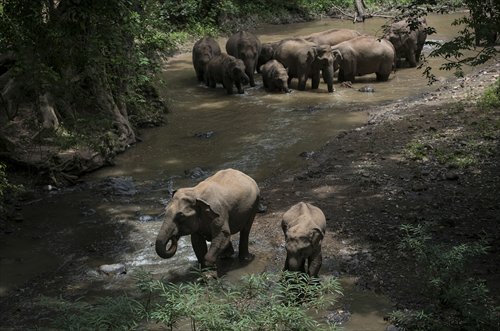Woman in Yunnan injured by wild elephants, triggering discussion on ways to reduce human-elephant conflict
Source: Global Times Published: 2020/10/11 21:24:28

A herd of wild elephants are spotted at a riverside in the Wild Elephant Valley in Xishuangbanna Dai Autonomous Prefecture, Southwest China's Yunnan Province, on June 21, 2014. File Photo: IC
A local woman was reportedly severely injured by wild elephants in Pu'er, Southwest China's Yunnan Province on Saturday, triggering a discussion on Chinese Twitter-like Sina Weibo on how to find a balance in the relationship between humans and wild animals.
The woman, her husband and their 5-year-old daughter from Naji village of Pu'er encountered a group of elephants on their way to pick tea-leaves by motorcycle. A video by Pear Video showed the woman lying on the ground with a group of villagers around her trying to calm her down, and a local resident explained that her thigh may have been trampled on by elephants.
A local doctor in the video said several of her ribs were broken and she had internal bleeding. Fortunately, her husband carried their daughter into the forest to avoid being hurt by the elephants.
A local worker said over 20 wild elephants have recently been wandering around Naji village, damaging houses and eating food, and warnings have been sent out daily, according to the video.
There were over 54 million reads of the topic as of press time on Weibo. Chinese netizens expressed understanding for the need to protect wild elephants, but also showed their sympathy to the villagers who had been attacked by them.
Some wanted to know the reason that caused this incident. Guo Peng, director of the Center for Animal Protection Studies at Shandong University, told the Global Times on Sunday that it is difficult to determine the exact reason behind the incident without enough information, saying it could have been due to a lack of food or living space.
We should consider "keeping people as far away from wild animals as possible," Guo said.
Guo took the "101 vital elephant corridors across India" as an example, which allow elephants to move freely between secure habitats, without being disturbed by activities of humans. Local members of wildlife conservation helped the residents living in places where elephants pass through to relocate and compensate them, Guo explained, adding that they will plant crops for the elephants and let them walk along a fixed food belt and identify those regions to keep people away.
At the INCLUSION Fintech Conference held in Shanghai on September 25, an intelligent collar using China's BeiDou Navigation Satellite System was unveiled, which allows elephants to be tracked in real time to ease concerns over human-elephant conflicts.
As the last habitat of wild elephants in China, Yunnan is the frontline for Asian elephant conservation, and "the population of wild Asian elephants has increased to around 300," Asian Elephant Protection project lead Cao Dafan with the International Fund for Animal Welfare told the Global Times on Sunday.
Multiple measures such as taking out insurance to compensate losses caused by elephants and monitoring elephant movements through cutting-edge technology have been adopted, Cao said, noting that the incident reinforced the need to strengthen monitoring and enhance education and training in conflict prevention.
From 2011 to 2019, there were over 4,600 accidents involving wild Asian elephants in Xishuangbanna in Yunnan, according to Xinhua News Agency.
Posted in: SOCIETY